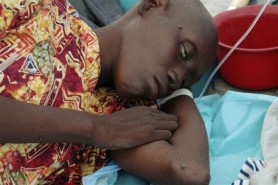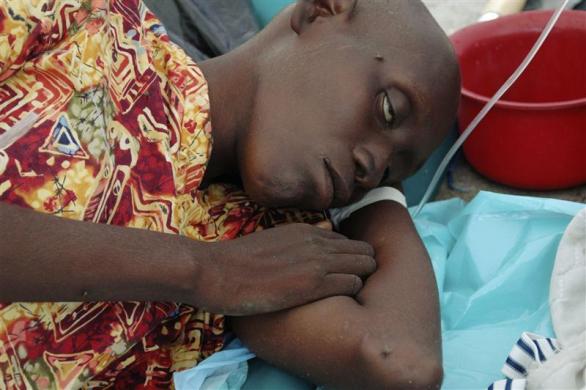PORT-AU-PRINCE (Reuters) – International medical teams are urgently responding to an outbreak of severe diarrhoea in central Haiti that a top government health official said yesterday had killed nearly 50 people in recent days.
Haitian Health Department Director General Dr Gabriel Thimote told Reuters that as of late Wednesday, 49 people had died and more than 450 were hospitalized in the outbreak.
Patients dehydrated by diarrhoea were overwhelming hospitals in the country’s Artibonite and Central Plateau regions, north of the capital Port-au-Prince, he said. The outbreak appeared to be the most serious health incident to affect the poor Caribbean country since a devastating January 12 earthquake that killed up to 300,000 people and injured many more, mostly in the capital. Officials from the Pan American Health Organization (PAHO) and the UN Office for the Coordination of Humanitarian Affairs (OCHA) said they were cooperating with Haitian authorities over what they were calling an “outbreak of acute diarrhea.”
They said samples from the sick and dead were being analyzed in a laboratory to try to determine the precise cause, which was unknown at the moment. “It’s the severity of the outbreak that preoccupies us, and then the unconfirmed but reported high number of dead … all of that is being investigated,” PAHO’s senior programme managing officer in Haiti, Dr Michel Thieren, told Reuters.

But he said his organization did not yet have verified numbers of those dead and sick in the outbreak.
OCHA spokesperson Jessica DuPlessis said medical teams from the huge international relief effort that has been helping Haiti since the quake had deployed to the main area of the outbreak, north of Port-au-Prince.
“They want to make sure that it doesn’t spread,” she told Reuters.
Thimote said many of the 49 victims died in a matter of hours from dehydration as they tried to reach a hospital.
The victims were of all ages, but the young and the elderly appeared to be the most affected, he added.
The Jan. 12 earthquake left around 1.5 million homeless survivors living in crowded tent and tarpaulin camps in and around Port-au-Prince, but despite initial fears of epidemics, a massive international relief effort has prevented any serious outbreaks of infectious diseases in the wrecked capital.
No victims from the diarrhea outbreak have so far been reported in Port-au-Prince. The worst-affected areas were Douin, Marchand Dessalines and zones around Saint-Marc in the Artibonite region, Thimote said.






